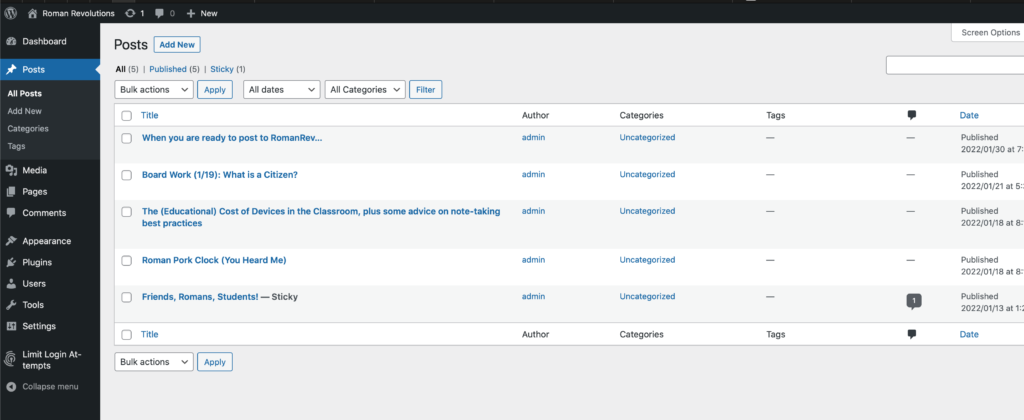Stoicism in the BBC
8th March 2022
For many people, the world is in a state of upheaval that can feel difficult to cope with, but can the teachings of the Stoics help in these troubling times?I
It was a life of difficulty. Born into slavery, at one point his master broke his leg, leaving him disabled. Eventually freed, he spent the next 25 years pursuing his calling – only for his career to be outlawed by the dictator in charge. He fled abroad, an exile and in poverty.
These sketchy biographical details are almost all that we know of the life of the philosopher Epictetus, born around AD55…. [read more]
Politics Mastery Quiz Cometh!
Greetings Roman,
This week you’ll prove your knowledge of Roman politics by completing a simple quiz on important attribute, offices, and organs in the Roman government. Since the game operates within the parameters of Roman governance, it is vital that you understand the players, the processes, and the parts or the Republic.
The quiz will consist of around 30 questions in 3 parts:
- Magistracies & Assemblies
- True / False about the Roman constitution, political offices, etc.
- General Politics & Scenarios (here you will receive a very short sketch of a situation or action and you will select what happens next based on your knowledge of Roman politics).
To successfully complete the map quiz, you must by the end of the day on SATURDAY.
☐ Complete your quiz with honor. This quiz is closed book and must be completed without notes or other resources.Once you have seen the quiz, you should not refer to notes or other resources. You have as long as you need to take the quiz but it must be done in a single sitting.
☐ Correctly identify at least 90% of the items on the quiz.
If you have scored above an 80% you may automatically revise your quiz (see course blog, “Guidelines for Revising Quizzes”, for more information).
You may RETAKE a quiz with a lower score by use of a tabella.
To help you prepare, here are several resources. In essence, if you know the information on these two documents, you will have your basic Roman politics down (note that you’ve already encountered all of this; this quiz is an opportunity to consolidate that knowledge and spot any gaps in advance of the game).
- The Cursus Honorum Handout (slightly updated)
- This flow chart, slightly less confusing than the one shown in class.
If you have any questions, please do not hesitate to ask.
When you are ready to take your quiz, you may do so here.
Martial, Book of Spectacles 24
This is another epigram commemorating the opening of the Flavian Amphitheater. Reread the introduction to Martial in Francese to review the context.
Whatever Rhodope* is said to have watched on Orpheus’ stage,
Your amphitheater, Caesar, displayed to you.
Cliffs crept close and up ran a forest–incredible!–
A forest like the grove of the Hesperides might have been.
Every species of wild beast was there mingled with livestock
And above the poet many birds petched,
But the poet was laid low, torn apart by an unpleasing bear:
This alone happened au contraire.**
* a mountain in Thrace.
**[i.e. contrary to the expected story; the last words of the Latin poem are in Greek, and literally mean “contrary to the story”]
If you are unfamiliar with the basic myth of Orpheus, you can read a short summary, here. Note that between his attempt to rescue his wife from the Underworld and his death at the hands of the Maenads, Orpheus sat in the shadow of Rhodope and sung a lament for his lost beloved. The song was so beautiful that nature itself approached to listen, as the mosaic below illustrates.
Here, for the Latinate among you, is the original poem.
Quidquid in Orpheo Rhodope spectasse theatro
dicitur, exhibuit, Caesar, harena tibi.
Repserunt scopuli mirandaque silua cucurrit,
quale fuisse nemus creditur Hesperidum.
Adfuit inmixtum pecori genus omne ferarum 5
et supra uatem multa pependit auis,
ipse sed ingrato iacuit laceratus ab urso.
Haec tantum res est facta [par’ ‘istorian].
Review of “New Approaches to Greek and Roman warfare”
If you were interested in learning more about ancient battle in practice and aftermath, there’s a review of an interesting new book in Bryn Mawr Classical Reviews: Lee L. Brice, ed., New approaches to Greek and Roman warfare. Hoboken: Wiley-Blackwell, 2020. Pp. 216. ISBN 9781118273333. $69.95.
This collected volume offers “new approaches” to ancient warfare. So what’s new? The most prominent theme, linking four of the thirteen essays, is that of military psychology.
Roman siege expert Josh Levithan’s piece on “moral and morale” in sieges investigates why sacks of ancient cities were so merciless, pointing out that by closing their gates those within a city had refused a fair fight in the fields outside, denying the besiegers the contest in the virtus of all combatants that an open-field battle promised. When the city fell they were not, therefore, entitled to the ethical protections a fair fight granted the defeated, since they were themselves fighting in an immoral fashion. Levithan also points out that the taking of fortified places required not merely normal military courage, but—from those few first over the wall—exceptional, almost suicidal, courage, setting an “oddly epic stage” (145); the long fatigues of the siege, followed by such extreme heroism, also made the successful besiegers think that they were entitled to the greater satisfactions (in slaughter, rape, and plunder) of an unrestrained sack. This paper deserves praise too for its sensitive treatment of the relationship between actual ancient combat and literary depictions of ancient combat, a particular interest of this reviewer, but judging by other work recent and forthcoming, an expanding area of scholarly concern….
LIBERTAS — The Completed Introduction
Guidelines for Revising Quizzes
If you earned below the specification threshold on a quiz, you can can still complete the activity by revising it.
In general, if you miss the threshold by 1 question, you automatically have the opportunity to revise your quiz; please note that if revising you must successfully revise all the questions you missed to complete the quiz successfully. If you have scored lower on a quiz, you may still revise using a tabella (tabella must be submitted with revisions).
To revise a quiz you must:
- complete a question-by-question reflection detailing (1) what you missed or misunderstood and (2) why for every error. Your reflection for each question must include (3) the correct answer.
- Complete the revision by attaching a “wrapper” that summarizes the kinds of errors that you made and outlines a plan to prevent them in the future (in this class and beyond). This wrapper should be a few sentences to a short paragraph. It need not be extensive, but it should demonstrate serious consideration of the your process leading up to and in taking the quiz and how to improve your process in the future.
- The revision should be emailed to me before the start of the second class after the quiz.
Geography Mastery Quiz
This week you’ll prove your knowledge of Roman spaces by completing a simple map quiz on important places in the Western Mediterranean, Italy, and the City of Rome.
To successfully complete the Geography Mastery Quiz, you must by the end of the day on SATURDAY.
☐ Complete your quiz with honor. This quiz is closed book and must be completed without notes or other resources. Once you have seen the quiz, you should not refer to notes or other resources. You have as long as you need to take the quiz but it must be done in a single sitting.
☐ Correctly identify at least 90% of the spaces on the quiz.
If you have scored above an 80% you may automatically revise your quiz (see course blog, “Guidelines for Revising Quizzes”, for more information).
You may RETAKE a quiz with a lower score by use of a tabella.
To help you prepare, here are several resources.
- The Study Guide (places and maps)
- A pair of blank maps in the format that will appear on the quiz (with one answer marked to show how the quiz will be set up).
- Your book, Ancient Rome on 5 Denarii at Day includes a nice map of Rome on pp. 136-37
If you have any questions, please do not hesitate to ask.
When you are ready to take your quiz, you may do so here.
When you are ready to post to RomanRev…
A) log-in at: http://romanrev.iris.sites.haverford.edu/wp-admin/. You should have received an email inviting you to register for the site.

B) Select “Posts” in the left menu’ then “Add New”

C) Add your post into the text field, add a catchy title and the necessary categories, and click PUBLISH. OR edit an existing page as needed. Always remember to click PUBLISH.

Board Work (1/19): What is a Citizen?

